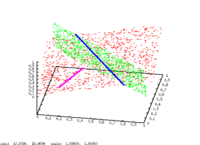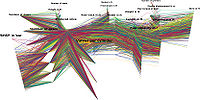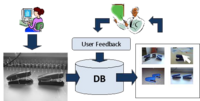[ Overview | Projects | Achievements | Cooperations ]
Research Projects of Group Seidl
Data Mining and Routing in Traffic Networks
| Period: | since 2007 |
| Project Website: | Data Mining and Routing in Traffic Networks Online Code Repository |
Modern spatial databases describing traffic networks provide a variety of information about the connections of two locations. For example, a database might store the distance, the speed limit, the altitude difference or the number of traffic lights for each road segment. Thus, a driver might want to consider various criteria at the same time.
Clustering High Dimensional Data
| Period: | since 2001 |
| Funding: | |
| Project Website: | Clustering High-dimensional Data |
High-dimensional data is prevalent in many applications and poses several new challenges for clustering algorithms. In this project, we explore the fundamental problems occurring in high dimensional spaces (a.k.a. "curse of dimensionality") in light of clustering and develop new, specialized methods for efficient and effective cluster analysis in high dimensional data.
ELKI: Environment for deveLoping KDD-applications supported by Index-structures
| Period: | since 2003 |
| Project Website: | ELKI |
The software system ELKI presents a large collection of data mining algorithms and support of database queries by arbitrary index structures. ELKI also enables to work on arbitrary data types given supporting data classes and distance functions.
Outlier Detection
| Period: | since 2008 |
| Project Website: | Outlier Detection |
Data Mining in Bioinformatics
| Period: | since 1993 |
| Funding: |
|
| Project Website: | Bioinformatics |
The research group of Hans-Peter Kriegel has a long standing tradition in contributing database support and data mining methods to the application domain of bioinformatics. Among these methods are classification and similarity search in 3D molecular databases, database support for the one-to-many protein docking search, data mining solutions to prediction of protein function, protein structure, and protein subcellular location.
Knowledge Discovery in Large Collection of Complex Objects
High Performance Data Mining
| Period: | since 2001 |
| Funding: | German Research Foundation (DFG) (2005-2008) |
| Project Website: | High Performance Data Mining |
This project deals with performance issues of data mining algorithms. In particular, we explore data structures and new algorithmic concepts to make data mining solutions scalable to very large databases.
Adaptive Similarity Search
| Period: | since 2006 |
| Project Website: | Adaptive Similarity Search |
An important aspect when looking for similar data objects is the underlying concept of similarity. Since this concept might depend on the current user or even the current situation it is important that a similarity search system is capable to adapt to multiple similarity functions. Further problems in adpative similarity search include capturing the user intention, learning similarity functions and indexing objects for similarity queries with varying concepts of similarity.
Efficient Reverse Nearest Neighbor Search
| Period: | since 2006 |
| Project Website: | Reverse Nearest Neighbor Search |
This project explores data structures and algorithms for various variants of the reverse k-nearest neighbor (RkNN) problem, including e.g. classical RkNN queries, RkNN rankings, constrainted RkNN queries, etc.
Similarity Search in Spatial and Multimedia Databases
Ähnlichkeitssuche für Medizin, Biologie und Multimedia Adaptable Similarity Models, Quadratic Form Distance Functions, Ellipsoid Queries (exact and approximate), Reduction of Dimensionality, Optimal Multi-Step k-Nearest Neighbor Search, k-NN Classification





